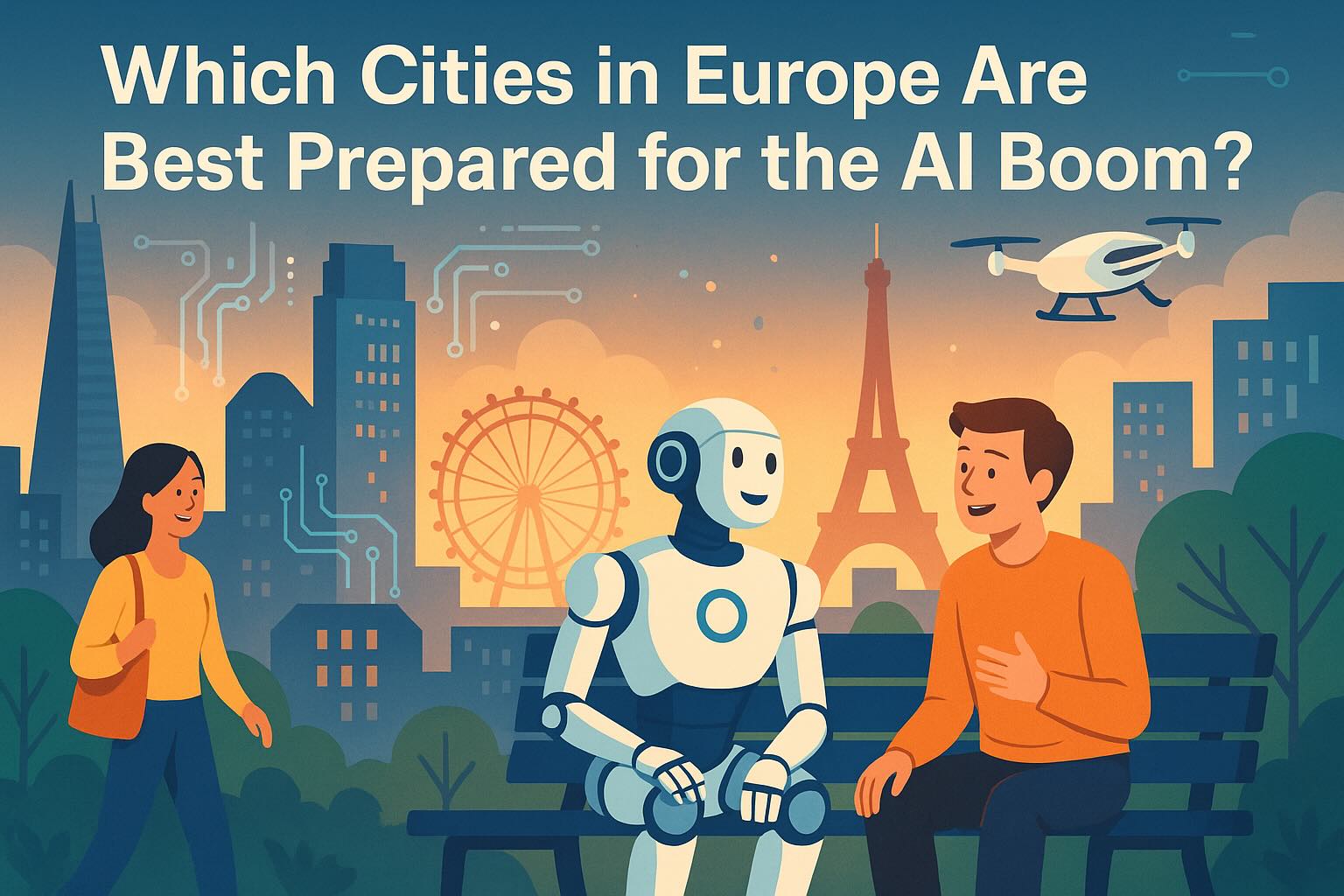
Date:
19 May 2025
Europe’s artificial intelligence boom is gathering pace, and a handful of cities are emerging as key hubs set to reap the benefits. These cities combine cutting-edge infrastructure, world-class research institutions, abundant tech talent, vibrant startup ecosystems, and supportive policy environments. In this article, we rank the leading European cities best positioned to thrive in the AI era, based on their current readiness and short-term growth potential.
Several factors determine a city’s ability to benefit from the AI boom:
Digital & Physical Infrastructure – High-speed internet, data centres, supercomputing facilities, and reliable transport networks.
Research Institutions & Universities – Presence of top-notch universities, AI research labs, and innovation centres.
Tech Talent Pool – Availability of skilled engineers and data scientists.
Startup & Innovation Ecosystem – A thriving startup scene with accelerators, incubators, venture capital, and successful tech firms.
Policy Support & Investment – National and local government initiatives, funding programs, and favourable regulations.
London stands out as Europe’s AI capital a powerhouse with unparalleled resources and momentum. It’s home to the continent’s largest AI talent pool and most investors. London alone accounts for about 12% of all AI specialists in Europe, with over 20,000 engineers focused on AI. This deep talent base is bolstered by world-class universities (Imperial College, UCL, etc.) and the Alan Turing Institute, the UK’s national AI research center headquartered in the city.
London’s startup ecosystem is equally formidable. It hosts countless AI startups and scaleups, supported by a wealth of accelerators and incubators. Major AI-driven companies like DeepMind (pioneering deep learning research) and Stability AI (a leader in generative AI) are headquartered in London, anchoring the community. In 2024, UK-based AI companies secured nearly $6 billion in funding more than France and Germany combined and a large share of that investment flows through London. The UK government has also declared an ambition to make Britain an “AI superpower,” launching a National AI Strategy and dedicated AI Growth Zones to fuel development.
London’s advantages span infrastructure and policy too. The city boasts numerous tech hubs and AI research centres, along with strong digital infrastructure (it is one of Europe’s largest data centre markets). National policy initiatives like hosting the world’s first AI Safety Summit in 2023 and investing in new AI research institutes underscore a supportive environment. In short, London combines scale and dynamism: it leads Europe today and is well positioned to continue leading the continent’s AI boom.
Paris has rapidly become one of Europe’s top AI hubs, challenging London’s lead in several areas. The city benefits from France’s strong national strategy and its own rich ecosystem of talent and startups. Under the “France 2030” plan, the French government has pledged €30 billion to foster tech innovation (aiming for 100 new tech “unicorn” companies) with AI a central focus. As a result, investment in French AI startups surged by 82% in 2024 to reach about €1.9 billion, indicating an accelerating growth trajectory.
Paris excels in both research and talent cultivation. The metro area hosts over 150 AI-focused R&D labs and research institutions, including renowned centres like INRIA (which runs a joint AI lab with Microsoft) and corporate labs such as Google AI in Paris. Elite universities (like Polytechnique and Sorbonne) and specialised programs produce a steady stream of AI engineers Paris accounts for nearly 3.8% of Europe’s AI talent pool, second only to London. The city’s talent attractiveness is helped by initiatives like the French Tech Visa, making it easier for international AI experts to work at Parisian startups.
The Paris startup ecosystem is vibrant and well-funded. The city is known for tech unicorns in AI and related fields for example, local startup Mistral AI made headlines by raising over $1 billion within a year of founding, positioning itself as a leading European AI firm. Paris also hosts Station F, the world’s largest startup campus, which is home to many AI companies and provides a collaborative community. From healthcare apps like Doctolib to autonomous driving ventures, Parisian startups are leveraging AI across industries. With strong support from both government and a large network of investors, Paris is poised to continue its rise combining current readiness (in talent and research strength) with enormous growth potential fueled by public and private investment.
Berlin has earned a reputation as a creative, up-and-coming tech hub, and it’s making its mark in AI as well. Germany’s capital offers a unique mix of relatively affordable living and a hip startup culture that has drawn entrepreneurs from across Europe. Berlin’s tech ecosystem is already well-established especially in sectors like software-as-a-service (SaaS), fintech, and e-commerce and AI startups are now a growing part of that scene. Notable tech firms such as Zalando (e-commerce) and N26 (fintech) are based in Berlin and increasingly integrate AI into their products, helping cultivate local AI expertise.
In terms of talent and research, Berlin is one of the continent’s hotspots. It hosts branches of leading research organizations, including the German Research Center for Artificial Intelligence (DFKI), and several universities with AI programs. The Berlin-Brandenburg region is estimated to contain about 2.65% of Europe’s AI talent a significant share and local initiatives aim to grow this further. In fact, German officials expect AI companies in the Berlin area to generate over €2 billion in annual revenue by 2025, highlighting strong growth prospects.
Berlin’s infrastructure and policy support for AI are on the rise too. The federal government has launched a €1 billion Deep Tech & Climate Fund to invest in next-gen tech startups (including AI), and Berlin is often a beneficiary as one of Germany’s startup capitals. The city also benefits from Germany’s nationwide AI strategy, which includes funding new AI research centres and training programs. While Berlin’s AI ecosystem is smaller than London or Paris for now, it enjoys steady growth. Its blend of industrial R&D and startup agility positions the city to benefit greatly as AI adoption deepens in Germany’s economy.
Amsterdam punches above its weight in the AI arena thanks to a highly educated workforce, excellent connectivity, and an open business climate. The Dutch capital has long been an international tech hub, and in AI it has developed strengths in areas like applied AI, fintech, and sustainability. Amsterdam’s population is extremely digitally literate, and local universities are top-notch the University of Amsterdam is among Europe’s leaders in producing AI researchers. This academic strength feeds the city’s talent pool and innovation pipeline.
The startup ecosystem in Amsterdam is dynamic and well-supported. Entrepreneurs benefit from generous tax incentives and grants offered by the Dutch government to encourage tech innovation. The city has attracted significant investment in star companies that leverage AI, such as payments firm Adyen and travel platform Booking.com. It also hosts major tech events (like The Next Web Conference) that spotlight AI and deeptech developments, creating buzz and networking opportunities for startups. Amsterdam’s culture of collaboration visible in its many co-working spaces and tech meetups helps nurture young AI companies.
Infrastructure-wise, Amsterdam is very strong in digital connectivity. It is one of the primary internet exchange hubs in Europe (AMS-IX), ensuring top-notch bandwidth and cloud services access. The city is also a key node for data centers in Europe, which is vital for AI companies requiring computing power. On the policy front, the Netherlands has an active AI strategy and participates in EU-wide AI programs, complementing Amsterdam’s local initiatives (for example, the city encourages AI solutions in public services and smart city projects). All these factors make Amsterdam exceptionally well-prepared for the AI boom. It may not be the largest market, but its efficient ecosystem and high quality of talent give it outsized potential to produce the next wave of AI innovations.
Zurich has a unique profile among Europe’s AI hubs: this Swiss city is smaller than most on this list, yet it boasts an extraordinary concentration of AI talent and research. In fact, roughly 14% of Zurich’s entire engineering workforce specialises in AI a higher proportion than any other major European city. This is fueled by academic and corporate strength. Zurich is home to ETH Zurich, one of the world’s top technical universities, and the associated Max Planck-ETH Center for Learning Systems, a leading AI research institute. These institutions attract top researchers from around the globe and generate breakthroughs in machine learning and robotics.
The city’s AI ecosystem benefits from a strong corporate presence as well. Many tech multinationals choose Zurich for their European R&D centers due to Switzerland’s stability and skilled workforce. Notably, Google established its largest non-U.S. research lab in Zurich, focused on machine learning. Other companies, from finance to pharmaceuticals, use Zurich as an AI innovation base. This creates plenty of opportunities for startups and spin-offs – often in deep tech fields that leverage the region’s research, such as AI in finance, healthcare, and automation.
Infrastructure and support in Zurich are also world-class. Switzerland’s digital infrastructure is excellent, and Zurich benefits from national AI initiatives the Swiss government has an AI strategy and funds programs via institutions like the Swiss National Science Foundation. While not in the EU, Switzerland participates in European research collaborations. Moreover, Zurich’s quality of life and funding availability (thanks to strong investors and proximity to wealthy industry partners) make it a fertile ground for talent and startups. Overall, Zurich’s current readiness is superb it’s already an AI powerhouse in research and talent density and its growth potential remains solid, though perhaps a bit more measured given its size. It will continue to produce disproportionate AI innovation relative to its population.
Barcelona is fast emerging as a major AI hub, backed by significant new investments in infrastructure and innovation. The Catalan capital has been selected to host one of the European Union’s first “AI Factories” a cutting-edge facility integrating supercomputing with AI development. Barcelona’s MareNostrum supercomputer, one of Europe’s fastest, is being upgraded as part of this AI Factory initiative. Nearly €200 million is being invested by the EU and Spanish governments to establish the AI innovation hub in Barcelona. This will dramatically expand the city’s computing infrastructure for AI, giving startups and researchers access to world-class resources and boosting Barcelona’s appeal in the AI field.
Barcelona’s growing status is not just about hardware it’s also about a thriving ecosystem and talent base. The city has a strong tradition in technology and science, with institutions like the Barcelona Supercomputing Center and several universities (e.g. UPC) contributing to AI research. It’s known for hosting the annual Mobile World Congress, and increasingly AI-focused conferences are choosing Barcelona as well, reflecting its rising profile. Local startups in sectors from smart mobility to biotech are adopting AI, and international companies are setting up AI labs here to tap into the region’s expertise.
Importantly, policy support from both Spain and the EU underpins Barcelona’s AI ambitions. Spain’s national AI strategy identifies Barcelona as a key node, and the EU’s selection of Barcelona for the AI Factory confirms its strategic importance. The city is also leveraging its vibrant entrepreneurial culture Barcelona has numerous incubators and innovation programs (such as Barcelona Tech City) that are now expanding to include AI. While a few years ago Barcelona was not typically listed among Europe’s top AI cities, its short-term growth potential is now among the highest. By the end of 2025, when the new AI hub is fully operational, Barcelona is expected to stand shoulder-to-shoulder with the more established players in driving Europe’s AI boom.
Munich is Germany’s second entry in the AI top ten and it brings a distinct strength: the integration of AI with industry and manufacturing. As the capital of Bavaria, Munich sits at the heart of Germany’s automotive and engineering sectors (BMW, Siemens, and others are headquartered here). This industrial might is increasingly paired with AI research and startups focusing on applied AI. For example, Munich is home to Helsing, a defence AI software startup which in 2024 raised an impressive $484 million to develop AI solutions for security and military applications. Such big funding rounds underscore the investor confidence in Munich’s AI scene and its potential to produce globally competitive AI products.
The city benefits from strong academic and research infrastructure. The Technical University of Munich (TUM) is one of Europe’s top technical universities and has extensive AI and robotics programs. TUM, along with Ludwig Maximilian University (LMU), produces highly skilled graduates and research spin-offs in AI. Munich also hosts the Munich Center for Machine Learning (MCML) and Fraunhofer AI research units, tying academic advances to real-world industry needs. This tight academia-industry link is Munich’s hallmark AI innovations in Munich often target manufacturing, automotive driving, Industry 4.0, and other domains where the region’s companies excel.
On the policy side, Bavaria’s regional government has been very proactive in tech investment. There are dedicated funding schemes for AI and even a state-backed initiative to make Bavaria an “AI region” through supporting research chairs and startup grants. Coupled with Germany’s national AI funding (Germany announced €3 billion for AI R&D in recent years), Munich enjoys a healthy flow of public support. The city’s quality of life and robust economy also attract international talent. Munich’s current AI landscape is strong in its niche (applied AI for industry) and the short-term growth looks promising, especially as more traditional German companies in Munich pivot to AI and pump venture capital into local startups.
Dublin has quietly become a significant AI hub, thanks to a confluence of tech multinationals and local talent. Often called the “Silicon Docks”, Dublin’s tech district hosts the European headquarters of Google, Meta (Facebook), Microsoft and other giants – and many of these offices have major AI teams. This has cultivated a strong base of AI expertise: an estimated 17% of Dublin’s software engineers specialise in AI, over twice the European average. In other words, Dublin’s tech talent is unusually AI-focused, giving the city a high concentration of AI skills relative to its size.
The presence of big tech firms has also spun off many startups and innovation labs in Dublin. Engineers leaving Google or Facebook often start their own ventures, some of which are AI startups in areas like enterprise software, fintech, and now generative AI. For example, the city recently saw the launch of Gemmo AI, a generative AI startup, adding to a growing roster of homegrown AI companies. Dublin’s startup ecosystem benefits from Ireland’s business-friendly environment including low corporate taxes and English-speaking workforce which continues to attract overseas founders and investors.
Infrastructure and policy support in Dublin are strong. Ireland’s government has initiatives to support AI adoption (such as the AI Innovation Hub and academic-industry partnerships) and has been investing in upskilling workers for AI roles. Digital infrastructure in Dublin is excellent: the city is a key node in transatlantic data cables and hosts many large data centres due to the cloud operations of Amazon, Microsoft, etc. This ensures plenty of computing power for AI development. One challenge has been housing and cost-of-living increases in Dublin, but the city remains very attractive for tech professionals, evidenced by the steady influx of international talent into its companies. With its unique cluster of Big Tech and startups, Dublin is extremely well positioned to benefit from the AI boom – it has ready-made AI expertise and investment, and in the near term we can expect more AI products and companies emerging from Ireland’s capital.
Stockholm is the leading AI hub in Scandinavia, built on a legacy of successful tech companies and a society quick to embrace new technologies. The Swedish capital consistently produces globally recognised startups from Spotify to Klarna and this entrepreneurial culture now extends to AI ventures. In fact, Sweden (with Stockholm at the forefront) has seen an astonishing 1,127% increase in AI industry revenue in recent years, one of the highest growth rates globally. This reflects how rapidly Swedish startups have pivoted to AI and how attractive the country is for new AI businesses. Stockholm in particular hosts many of these high-growth companies, benefiting from its strong startup infrastructure established during the mobile and fintech booms.
A key strength for Stockholm is its deep tech talent pool and high digital competency. Education levels are very high, and institutions like KTH Royal Institute of Technology and the Karolinska Institute (for AI in healthcare) ensure a pipeline of skilled engineers and researchers. While the city’s share of Europe’s total AI talent is modest (~1–2% by some estimates), Sweden ranks among the top countries per capita for AI skills and adoption. Notably, Stockholm’s major tech firms also contribute – Ericsson, for example, is a telecom giant based in Stockholm that invests heavily in AI for 5G and networks, employing many AI specialists. This creates cross-pollination where corporate R&D experts might join startups or academic projects and vice versa.
The startup ecosystem in Stockholm is robust and well-funded. There are multiple incubators (like Sting and SUP46) that now have AI tracks, and venture capital firms in Stockholm have global reach. The Swedish government and Stockholm’s local authorities actively support AI development too. Sweden was one of the earliest countries to release a national AI strategy, and it promotes public-private collaboration (for instance, AI Sweden is a national center with a node in Stockholm that helps companies pilot AI solutions). Moreover, Sweden’s excellent digital infrastructure (ubiquitous high-speed internet, strong cloud computing adoption) and data openness are key enablers for AI. With solid foundations already in place and record-breaking growth, Stockholm is expected to remain a hotspot for AI innovation, especially in areas aligning with its strengths like music/creative AI, fintech, and telecommunications.
Athens might be a surprise entry in the top ten, but Greece’s capital is quickly transforming into an emerging AI hub for Southeastern Europe. The European Commission’s recent AI initiatives have shone a spotlight on Athens: it will host a new AI Innovation Factory in partnership with Greece’s flagship supercomputer, DAEDALUS. This EU-backed project, similar to Barcelona’s, will upgrade Athens’ computing infrastructure and link Greek researchers with European networks. In practical terms, Athens is getting cutting-edge facilities to develop and test AI a big boost to its tech scene.
Beyond infrastructure, Athens has been fostering a growing community of tech talent and startups. While smaller in size, the city’s AI talent pool is notable for its focus: about 13% of Athens’ engineers specialise in AI fields, which is on par with some more established hubs. Universities like the National Technical University of Athens and research centers such as NCSR Demokritos have active AI research groups, producing skilled graduates who increasingly choose to found or join startups locally rather than moving abroad. This brain gain is helping Athens build an innovation ecosystem in areas like AI for shipping (a nod to Greece’s maritime industry) and language technologies (Greek startups have worked on language AI that can handle less-resourced languages).
Local startup and policy support have also improved. The Greek government in recent years launched digital economy incentives and startup visas to reverse the brain drain and attract foreign investment. EU funds have gone into Greek tech incubators and accelerator programs. Athens now hosts events like the annual Athens Roundtable on AI, which brings international experts to discuss AI ethics and policy signaling the city’s ambition to be part of the wider AI conversation. Culturally, Athens’ startup scene emphasises collaboration and often focuses on social and ethical tech (perhaps due to the recent economic hardships that fostered a community-oriented approach).
Athens today is still up-and-coming, but its inclusion in major EU AI projects and its growing local talent mean its short-term growth potential is very high. It serves as a gateway for AI development in the Balkans and Eastern Mediterranean region. If the current trajectory continues with sustained investment and integration into European tech networks Athens could soon become a Southern European “dark horse” in AI, proving that the AI boom is not just confined to Europe’s traditional tech centres.
The AI revolution in Europe is not limited to one or two places it’s emerging as a network of innovative cities, each with its own strengths. London and Paris clearly lead in scale, boasting the largest talent pools, funding, and number of AI ventures. They are Europe’s twin engines in the AI race today. Berlin, Amsterdam, Zurich, Munich, and Stockholm form a strong second tier of hubs, each capitalising on unique advantages be it Berlin’s creative startup culture, Amsterdam’s connectivity and innovation mindset, Zurich’s research excellence, Munich’s industry integration, or Stockholm’s lightning-fast growth and tech pedigree. Finally, rising players like Barcelona and Athens highlight that new hubs can quickly ascend through strategic investment and by tapping into pan-European initiatives.
It’s also evident that collaboration and policy support play an indispensable role. European efforts from cross-border research networks to significant funding programs are lifting cities across the continent. National strategies (the UK’s push to be an AI superpower, France’s massive tech investment, Germany’s industrial AI focus, etc.) align with local initiatives in these cities. This multi-level support ensures that the AI boom has a broad foundation.
In the short term, we can expect intense competition as well as cooperation among these cities. Competition, to attract the best talent, startups, and investors; cooperation, in sharing research and setting ethical AI standards. For businesses and innovators, this is good news Europe offers a diverse range of vibrant hubs to choose from, each AI-ready in its own way. The cities ranked here are poised not only to benefit themselves, but also to drive Europe’s collective progress in the AI age. The race for AI leadership is global, and Europe’s top cities are gearing up to ensure the continent remains at the forefront of this transformative revolution.
UK Government AI Strategy and Alan Turing Institute
DeepMind, Stability AI, and London’s AI startup ecosystem (2024 funding reports)
France’s “France 2030” innovation programme and French Tech Visa
Mistral AI funding announcements and Station F overview
German AI strategy and Berlin’s Deep Tech & Climate Fund
German Research Center for Artificial Intelligence (DFKI)
Amsterdam’s AMS-IX infrastructure and University of Amsterdam AI research reputation
Dutch national AI strategy and innovation grants
ETH Zurich and Max Planck-ETH Center for Learning Systems
Google Zurich AI research centre
Swiss National Science Foundation and Swiss Federal AI Strategy
AI talent concentration estimates from pan-European tech talent studies (2023–2024)
Author
Sammy Salmela is a contributor to BestCityIndex with expertise in urban development and global city trends.
Stay updated with our latest insights and city rankings.

Introduction:The aroma of aged wheels, bubbling fondue, and freshly baked bread for cheese lovers, Europe is a true paradise. Here are five cities where cheese...

Date: 5 August 2025Source: AFP, Reuters, Local Weather AuthoritiesReading Time: 3 minutesIntroductionIn just one week, Asia has faced two stark climate...

Moving to Europe: Pros and Cons by Country for Work, Retirement, Education & Lifestyle Part 1.Moving from the United States to Europe is an exciting...



